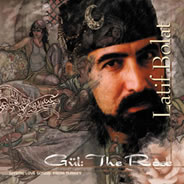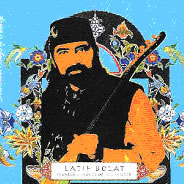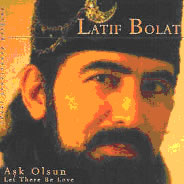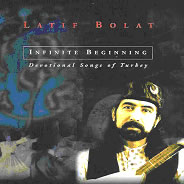 |
 GUL: THE ROSE (2005) GUL: THE ROSE (2005)
Since the 11th Century, Turkish people from the deserts of Samarqand to the mountains of Anatolia recited poetry in search of the ultimate Truth and union with the Beloved. With their strong shamanistic background, my ancestors blended Islamic and many other local rituals of Anatolia, creating the wonderfully Turkish ways of Sufi mysticism like the Bektashis, Mevlevis and many others.
For me the most important aspect of these poets from the past thousand years is their strong anti-materialistic attitude. As true mystics, these poets and troubadours let go all the comfort and facilities offered to them by the Sultans, and kings of their times. Instead, they pursued a relentless struggle to reach the Truth. Such an anti-materialistic attitude is so much in line with my own world philosophy in these times of rampant selling out of everything sacred and profane that I had to put this wonderful poetry in music. That’s why this recording is especially special to me since most of the songs are my own compositions from the last two years. Due to the wonderful nature of this mystic folk poetry, composing was almost a natural progression of reading them out loud. You’ll hear the sounds of the Iraq war in these compositions since they are also the impressions of the war in the Middle East. Therefore I consider this CD as my very own child, coming from my deepest passion for beauty and ever-growing desire for a peaceful and love-filled universe.
Why “Gul: The Rose” as the title of this recording? “Gul” is the Rose, the symbol of unfolding in the mystic Sufi tradition. Life starts in a bud and it unfolds to a magnificent beauty with a long painful journey regardless of all those thorns surrounding the flower, like “cooking oneself” thru the difficulties of life. However, once the unfolding is completed, you get the most magnificent of all flowers. Rose is also the symbol of innocence in Turkish folk and court poetry, often depicting the beloved. I even catch myself calling a stranger “gulum”, “my rose” when I want to be sweet to the person. However, practically the title of this CD comes from a song I am singing in this very recording, a poem from the great 16th Century poet Ummi Sinan. He dreams of a world where everything is rose. The idea of a world made of roses resonated with me so well that as soon as I learned this particular song, the name of my next CD became “Gul: The Rose”. As a wonderful linguistic coincidence, Gul also means “smile” in Turkish language! So may universe be filled with Roses of all kinds!
 EYVALLAH (2002) EYVALLAH (2002)
Here is another collection of Turkish devotional and folk songs from every walks of life and every region of my homeland, Turkey. The more I work on this repertory, the more I am amazed the amount of material I can reach. Literally tens of thousands of folk tunes, classical songs are begging to be discovered and sang-out to the world. In the humanist tradition lineage, I am meeting the first time all these incredible poets like Niyazi Misri, Kuddusi, Fahir, Seyfullah, Hilmi Dedebaba and many others. Even though the Western world is going crazy with Rumi these days, hundreds of genuinely humanist and universalistic folk philosophers and poets are also looking at us from the seventh skies and offering the healing power of their poems. I am bowing in front of them with great respect and saluting them with many selections from their songs in this collection. The title of this CD, “EYVALLAH” is a sufi greeting, especially prominent among the Bektashis. It reflects a sentiment of surrendering, accepting and acknowledging something that is presented to us by the Great arranger. These are the songs of such sentiments, reaching us from the last 800 years, from Yunus Emre to Nazim Hikmet. They are all jewels of Turkey and arranged as a bouquet of humble offerings to the good people everywhere from the beautiful Turkish people. EYVALLAH HU!
 ASHK OLSUN: LET THERE BE LOVE (2000) ASHK OLSUN: LET THERE BE LOVE (2000)
In our time of disposability, anything can be subjected to replacement; our cars, houses, cities, even countries. We use things and throw away so easily, even without thinking how much they meant to us when we had them. We live in a system and a world where any attachment or dedication to something can be considered as “old fashion” or “not so cool”. So we keep changing our jobs, our homes, cars; we keep moving to new cities or even countries, we get some strange excitement and enjoyment from replacing everything we have, even our relationships, so easily. This is true for the Western world as much as the old world, like Turkey. The old world is also catching up with the same type of “disposability” and “consumerism” ideals. Sufism was developed by gigantic poets and philosophers like Rumi, Yunus Emre, Haci Bektas, Nasreddin Hoca, Niyazi Misri, and hundreds of others. That humanist and universalistic base was indicated beautifully by Rumi in mid-13th century with such lines as: “Not Christian or Jew or Muslim, not Hindu, Buddhist, Sufi, or Zen. Not any religion or cultural system… I belong to the beloved, have seen the two worlds as one, and that one call to and know, first, last, outer, inner, only that breath breathing human being.” My humble work in Turkish devotional music is a result of trying to learn from the original masters of Turkish Mysticism like Yunus, Rumi, Pir Sultan Abdal, Haci Bektas and many others. Anatolian culture is a true fusion of many beautiful peoples since the time of Sumerians. In that mystical piece of land, Hitite, Greek, Armenian, Urartian, Arab, Kurdish, Jewish, Zoroastrian, Islamic, Christian, Turkish and many other incredible cultures blended so beautifully and created something truly unique; the culture of Anatolia. This recording tries to reflect the devotional and mystical aspect of the Anatolian culture, accumulated over thousands of years. The deep quality of devotion in these songs is the direct result of this beautiful blend of such devotional and dedicated people of Anatolia.
 INFINITE BEGINNING (1997) INFINITE BEGINNING (1997)
This debut CD contains some of the best and most beloved examples of the Turkish devotional chants, namely Zikr music. Ritual and prayer are aspects of Muslim spiritual life shared by mystics and non-mystics alike. But the distinctive worship of the Sufis is the Zikr, the remembrance of the Friend. Zikr is the first step in the way of love; when somebody loves, one repeats the Friend's name in order to constantly remember this essence in one's heart, consequently sees the Friend in all living beings. Turkish zikr music is the primary intermediary to create and sustain such a mood in which participants can experience the unity between themselves and the Truth in a trance atmosphere. “Ilahis”, one of the best known Turkish poetic and musical forms, are hymns based on poems written by Sufi saints. By inspiration, they are created to bring those present to God. In the Alevi-Bektashi tradition, these songs are called “Nefes”. The vast majority of these Turkish Zikr songs are based on the 13th century mystic poet Yunus Emre's lyrics. His down-to-earth folk style and devotion provides the perfect material for devotional chanting.
How to order CDs?
Please send an email message to lbolat@aol.com with your order information. All CDs are $15 each. Shipping costs $1 per order for USA. For orders from abroad shipping charge might be different.
|
|




